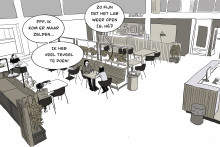UT researchers plan to use the donation from De Weijerhorst Foundation’s (Stichting de Weijerhorst) to develop a lab on a chip that should identify various types of cancer in urine. More specifically, they aim to detect so called ‘hypermethylated DNA’ (hmDNA), which signals the presence of cancer.
Even though it is possible to use existing techniques to demonstrate the presence of cancer in urine based on hmDNA, the process remains slow and strenuous. The donation will therefore ideally help to create a faster system, detect cancer more quickly and consequently to set up cancer screening at a large scale.
The donation agreement was signed today at the UT by representatives of De Weijerhorst Foundation, the Twente University Fund Foundation, the University of Twente and the MESA+ research institute. The funding will be used for a four-year project coordinated by Loes Segerink and Albert van den Berg from the MESA+ research institute that will also collaborate with the VUmc Cancer Centre Amsterdam.








